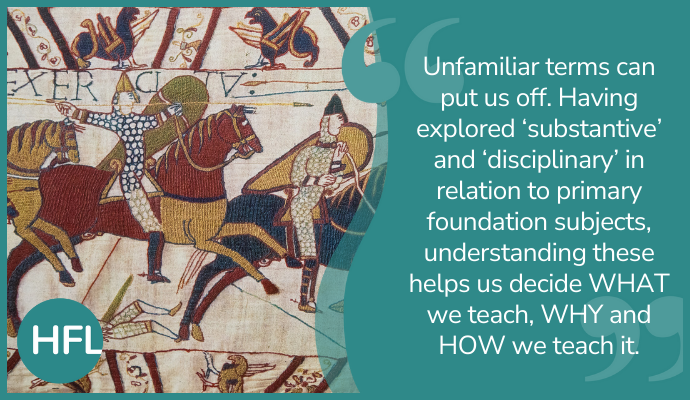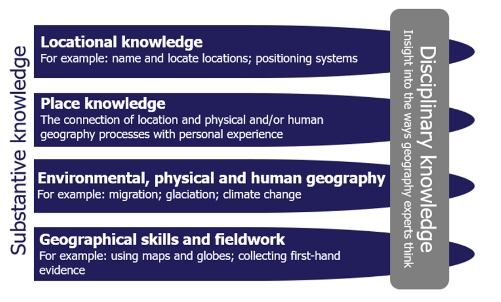
In our previous blog, we explored how subject leadership of foundation subjects at primary has changed quite a bit in recent years.
One of the areas of change has been the language we use to talk about the curriculum. I don’t remember when I first heard ‘substantive’ and ‘disciplinary’ used in relation to the primary foundation subjects, but it was relatively recently.
At first, not understanding the terms, I avoided using them – not wanting to get it wrong. So, in this blog I’d like to take on the challenge of exploring them, to clarify what they mean and the implications for our curriculum in foundation subjects and how we teach.
Whilst planning CPD sessions recently, focused on primary geography and history, I explored the subject research reviews from Ofsted for them, which made for a helpful starting point. If you are interested in either subject, the links to access the research reviews are here:
Ofsted’s research review: History
Ofsted’s research review: Geography
And, with perfect timing, Ofsted also released 6 new subject insights videos, covering history, geography, music, PE, science and personal development.
In both the subject research reviews and in the subject insight videos series, there are a number of references to substantive and disciplinary, which help us to understand their meaning and implications for our planning and teaching of primary foundation subjects.
Substantive and disciplinary knowledge within geography
Within the research review and the subject insight video for geography this diagram is used in the explanation of the terms:

This graphic to me suggests that the ‘substantive knowledge’ required in geography is largely the subject content, including aspects such as knowledge of places, physical and human geography, and also the knowledge required for using maps and carrying out fieldwork.
By contrast, ‘disciplinary knowledge’ is about the way geographers think. This may initially sound vague; how do we teach primary school children about ‘the ways geography experts think’? The added difficulty when planning for exposure to the ‘disciplinary knowledge’ is that, within the National Curriculum, it doesn’t really appear explicitly.
In the subject insight video, Mark Enser HMI says:
“…our ability to think geographically is based on the knowledge we have to think about.”
So let’s take a step back. Geographers have developed substantive knowledge over time: They have explored, mapped and gathered data; They have developed an understanding of the physical and human geography of our world.
So, you could say that the disciplinary knowledge is how the substantive knowledge has come about. In developing disciplinary understanding, we could consider:
- What questions geographers have explored;
- What skills and techniques have been chosen to help gather and analyse information;
- How findings have been presented and communicated
We need both the substantive and disciplinary within our curriculum. It would be hard to develop disciplinary knowledge without having a good grounding in the substantive knowledge.
I would argue that our teaching needs to better promote the disciplinary than it possibly currently does. This allows children to develop their ‘thinking like a geographer’. So that they ask questions, gather and evaluate information and draw conclusions. This is part of a broader set of life skills that help us to be active citizens of the world we live in, as well as preparing pupils for the next stage of their education.
Let’s imagine a Key Stage two geography unit focusing on Fair Trade and why it is important. We might have an overarching question for the learning: Why is Fair Trade important?
This might lead us to explore a combination of elements from the substantive knowledge areas:
- The location, human and physical characteristics of Ecuador, for example, in South America and the similarities and differences to our own location.
- The types of land use typically found in Ecuador and the economic activity, including trade with the production and export of goods such as bananas, chocolate, coffee and cotton.
- The impact of producing these crops on the physical and human geography of the area.
The disciplinary thinking helps us to answer the ‘why’ in the question: If the production of these goods is done in a way that treats farmers and workers fairly, then what is produced is likely to be more sustainable and farmers are better able to invest in their communities.
Substantive and disciplinary knowledge within history
So, what might the same terms substantive and disciplinary mean in the context of primary history?
Within Ofsted’s research review of history, it states:

Let’s put this into an example, to give some context:
The National Curriculum for history at KS2 includes studying:
- Britain’s settlement by Anglo-Saxons and Scots
- The Viking and Anglo-Saxon struggle for the Kingdom of England to the time of Edward the Confessor
Within a series of lessons, we might explore a question such as ‘What was it like to live in Britain at the time of the Anglo-Saxons?’
We know that, within the timeline of British history, Anglo-Saxon rule ended in 1066 with the Norman invasion, led by William the Conqueror. But how do we know this?

The Bayeux Tapestry depicts the story from 1064 up to the Battle of Hastings in 1066. The tapestry is believed to have been commissioned by William the Conqueror’s half-brother. You can explore The Bayeux Tapestry here.
Studying this tapestry as a piece of evidence, about what life was like at the time (aspects such as clothes, transport, weapons used in battle) and the events that took place between 1064 and 1066. In looking at the tapestry, we can also practice our ‘knowledge about how historians investigate the past’. We would note that this is one piece of evidence and may be giving a particular viewpoint. We might explore how other evidence helps to build up our understanding of what happened further.
To conclude
My interpretation is that substantive is largely the content matter of the subject, including the knowledge and skills of that subject, using the National Curriculum to guide us in what we select. Disciplinary is about how the experts in that subject think. You could suggest that this is more hidden (or implicit) within the National Curriculum at Key Stage 1 and 2. But, it is the disciplinary in action, used by the experts in that field, that has led to us have the substantive.
If education is (partly) about preparing pupils for the next stage of their education and for later life, then developing the disciplinary alongside the substantive is essential. The substantive alone is unlikely to be enough to really prepare pupils for their future learning or life out in the world.
We need both substantive and disciplinary knowledge to be gradually but explicitly developed within the curriculum for foundation subjects at primary, whilst understanding that it would be hard to develop disciplinary knowledge without having a good grounding in substantive knowledge.
When we construct or review the curriculum for a subject, we should explore how the planned curriculum enables teaching to promote the disciplinary learning. How it allows children to develop their thinking, beyond the substantive, so that they ask questions, gather, interpret and evaluate information, make decisions and draw conclusions – as part of a broader knowledge and skills set than the substantive content of a subject alone.
If you are interested in further reading; we have a blog series looking at ‘Progression in foundation subjects’, which explores how pupils make progress in their learning outside of the core subjects. There is also a thought piece on ‘The moral imperative: creating a curriculum that develops identity, broadens horizons and enables success for all’ – essential reading for subject and curriculum leaders thinking about curriculum purpose.
To keep up to date: Join our Primary Subject Leaders’ mailing list
To subscribe to our blogs: Get our blogs straight to your inbox



